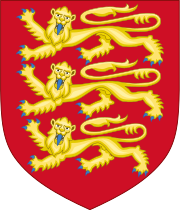Inglaterra anglo-saxã
Este artigo ou secção contém uma lista de referências no fim do texto, mas as suas fontes não são claras porque não são citadas no corpo do artigo, o que compromete a confiabilidade das informações. (Maio de 2019) |
Inglaterra anglo-saxã é um termo que se refere ao período da história da Inglaterra que vai do fim da Britânia romana e o estabelecimento dos reinos anglo-saxões, no século V, até a conquista normanda da Inglaterra, em 1066. Anglo-saxão é um termo abrangente para designar os colonos germânicos que invadiram a Grã-Bretanha durante os séculos V e VI, incluindo os anglos, saxões, frísios e jutos.
A Inglaterra anglo-saxã, até o século IX, era dominada pela Heptarquia, os reinos de Nortúmbria, Mércia, Ânglia Oriental, Essex, Kent, Sussex e Wessex. Estes reinos foram pagãos durante o período inicial, porém foram cristianizados durante o século VII. O paganismo teve seu último bastião durante o período da hegemonia mércia durante a década de 640, e que foi interrompida com a morte do rei Penda em 655.
A Casa de Wessex se tornou dominante durante o século IX, e passou a lidar com a ameaça das invasões viquingues, que foram combatidas com sucesso por Alfredo, o Grande. Durante o século X os reinos individuais foram unificados sob o domínio de Wessex, formando o Reino da Inglaterra, que se opunha ao Danelaw, a união dos reinos viquingues estabelecidos deste o século IX no Norte da Inglaterra e na região das Midlands Orientais. Todo o reino da Inglaterra sucumbiu à invasão dinamarquesa em 1013, e passou a ser governado pela Casa de Knýtlinga até 1042, quando a Casa de Wessex, anglo-saxã, foi restaurada, e deteve o poder até 1066, quando o último rei anglo-saxão, Haroldo II de Inglaterra, foi morto durante a Batalha de Hastings.
Bibliografia
[editar | editar código-fonte]- «Alfred and Guthrum's Peace». Internet Medieval Source Book. Consultado em 9 de fevereiro de 2010
- Allen Brown,R.; Chibnall, Majorie, ed. (1979). Anglo-Norman Studies I: Proceedings of the Battle Conference 1978. Londres: Boydell Press. ISBN 0851151078
en:s:Anglo-Saxon Chronicle. Comissionado durante o reinado de Alfredo, o Grande
- «The Anglo Saxon Dooms, 560 - 975AD». Internet Medieval Source Book. Consultado em 25 de janeiro de 2010
- Asser (2004). Keyne Lapidge tr, ed. Alfred the Great. [S.l.]: Penguin Classic. ISBN 978-0-14-044409-4
- Barlow, Frank (2002). The Godwins. Londres: Pearson Longman. ISBN 0582784409
- Beda.
en:s:Ecclesiastical History of the English People. Tradução com base em L.C. Jane (1903); A. M. Sellar (1907
- Bartlett, Robert (2000). J.M.Roberts, ed. England Under the Norman and Angevin Kings 1075 -1225. Londres: OUP. ISBN 9780199251018
- Bell, Andrew (2000). Andrew Bell-Fialkoff, ed. The Role of Migration in the History of the Eurasian Steppe:Sedentary Civilization vs. 'Barbarian' and Nomad. Nova York: Palgrave Macmillan. ISBN 0312212070
- Blair, John (2006). The Church in Anglo-Saxon Society. Oxford: OUP. ISBN 978019911173
- Campbell, James (2000). The Anglo-Saxon State. Hambledon: Hambledon Continuum. ISBN 1852851767
- Dião Cássio (2000) [1924]. E. Cary, ed. Roman History: Bk. 56-60, v. 7. Harvard: LOEB. ISBN 0674991931
- Charles-Edwards, Thomas (1981). Christianity in Roman Britain to AD 500. Berkeley: UC Berkeley. ISBN 0520043928
- Charles-Edwards, Thomas (2003). Thomas Charles-Edwards, ed. Short Oxford History of the British Isles: After Rome: Conversion to Christianity. Oxford: OUP. ISBN 9780199249824
- Charles-Edwards, Thomas (2003). Thomas Charles-Edwards, ed. Short Oxford History of the British Isles: After Rome: Nations and Kingdoms. Oxford: OUP. ISBN 9780199249824
- Crystal, David (2001). The Cambridge Encyclopedia of the English Language. [S.l.]: CUP. ISBN 0-521-59655-6
- Dark, Ken (2000). Britain and the End of the Roman Empire. Stroud: NPI Media Group. ISBN 0752414518
- Esmonde Cleary, A.S. (1991). The ending of Roman Britain. Londres: Routledge. ISBN 0415238986
- Gelling, Margaret; Coles, Anne (2000). The Landscape of Place-Names. Stamford: Tyas. ISBN 1 900289 26 1
- Gildas.
en:s:The Ruin of Britain. (1848). Tradução baseada em Habington e J. A. Giles
- Henry of Huntingdon (1996). Diana E. Greenway, ed. Historia Anglorum: the history of the English. Oxford: OUP. ISBN 0-19-822224-6
- Higham, N.J. (1994). English Conquest: Gildas and Britain in the fifth century. Manchester: Manchester United Press. ISBN 0719040809
- Hines, J., ed. (2003). The Ango-Saxons from the Migration Period to the Eighth Century: An Ethnographic Perspective. Londres: Woodbridge: Boydell Press. ISBN 1843830345
- Horspool, David (2006). Why Alfred Burned the Cakes. Londres: Profile Books. ISBN 9781867793
- Hunter Blair, Peter (1963). Roman Britain and Early England 55BC-- AD871. Londres: W W Norton. ISBN 0393003612
- Rev. James Ingram Tr (1912). Ernest Rhys, ed. Anglo Saxon Chronicle. Londres: J. M. Dent & Sons Ltd
- Jones, Michael E. (1998). The End of Roman Britain. Ithaca, NY: Cornell University Press. ISBN 9780801485305
- Kelly, S.E.; et al., eds. (1973–2007). Anglo-Saxon Charters Volumes: I - XIII. Oxford: OUP for the British Academy
- Kirby, D. P. (1978). Peter Brandon, ed. The South Saxons:The Church in Saxon Sussex. Chichester: Phillimore. ISBN 850332400
- Lapidge, Michael Ed.; John Blair, Simon Keynes, Donald Scragg (2001). The Blackwell Encyclopaedia of Anglo-Saxon England. Londres: Blackwell. ISBN 0631224920
- Mayr-Harting, Henry (1992). The Coming of Christianity to Anglo-Saxon England. Pennsylvania: University Press Pennsylvania. ISBN 0271007699
- Malcolm Errington, R. (2006). Roman Imperial Policy from Julian to Theodosius. Durham, NC: University of North Carolina. ISBN 0807830380
- Morris, John (1973). The Age of Arthur. Londres: Phoenix. ISBN 1-84212-477-3
- Myers, J.N.L. (1989). The English Settlements. [S.l.: s.n.] ISBN 0192822357
- Nênio.
en:s:History of the Britons. Tradução baseada em W. Gunn e J. A. Giles (1848)
- O'Reilly, Jennifer (2003). Thomas Charles-Edwards, ed. Short Oxford History of the British Isles: After Rome: The Art of Authority. Oxford: OUP. ISBN 9780199249824
- Pattison, John E. (2008). «Is it necessary to assume an apartheid-like social structure in Early Anglo-Saxon England?» (pdf). Royal Society. doi:10.1098/rspb.2008.0352. Consultado em 2 de junho de 2010
- «Guide to Scandinavian origins of place names in Britain» (PDF). Ordnance Survey. Consultado em 15 de janeiro de 2010. Arquivado do original (pdf) em 4 de dezembro de 2008
- Sawyer, Peter (2001). The Oxford Illustrated History of the Vikings 3.ª ed. Oxford: OUP. ISBN 0192854348
- Sherley-Price, Leo and Farmer, D.H., ed. (1990). Bede:Ecclesiastical History of the English People. Londres: Penguin. ISBN 014044565x
- Snyder, Christopher A. (2003). The Britons. Oxford: Blackwell. ISBN 9780631222606
- Starkey, David (2004). The Monarchy of England Volume I. Londres: Chatto & Windus. ISBN 0701176784
- Stenton, F.M. (1971). Anglo-Saxon England 3rd edition. Oxford: OUP. ISBN 9780192801395
- «Standard English words which have a Scandinavian Etymology». The Viking Network. Consultado em 15 de janeiro de 2010
- Vital, Orderico (1854). Thomas Forester Tr., ed. The Ecclesiastical history of England and Normandy. ii. Londres: Henry G. Bohn
- Ward-Perkins, Bryan (2005). The fall of Rome: and the end of civilization. Oxford: OUP. ISBN 0192805649
- Webb, J.F. and Farmer, D.H., ed. (1983). The Age of Bede. Londres: Penguin. ISBN 0140444378
- Welch, Martin (1992). Anglo-Saxon England. Londres: English Heritage. ISBN 0713465662
- William of Malmesbury (1847). J.A.Giles tr., ed. Chronicle of the kings of England:From the earliest period to the reign of King Stephen. Londres: Henry Bohn
- Williams, Ann (2003). Aethelred the Unready: The Ill-Counselled King. Hambledon: Hambledon Continuum. ISBN 1852853824
- Wood, Michael (1985). The Domesday Quest. Londres: BBC. ISBN 0153522747
- Wood, Michael (2005). In Search of the Dark Ages. Londres: BBC. ISBN 9780563522768
- Yorke, Barbara (1990). Kings and Kingdoms of Early Anglo-Saxon England. Londres: Taylor & Francis Ltd. ISBN 9780415166393




